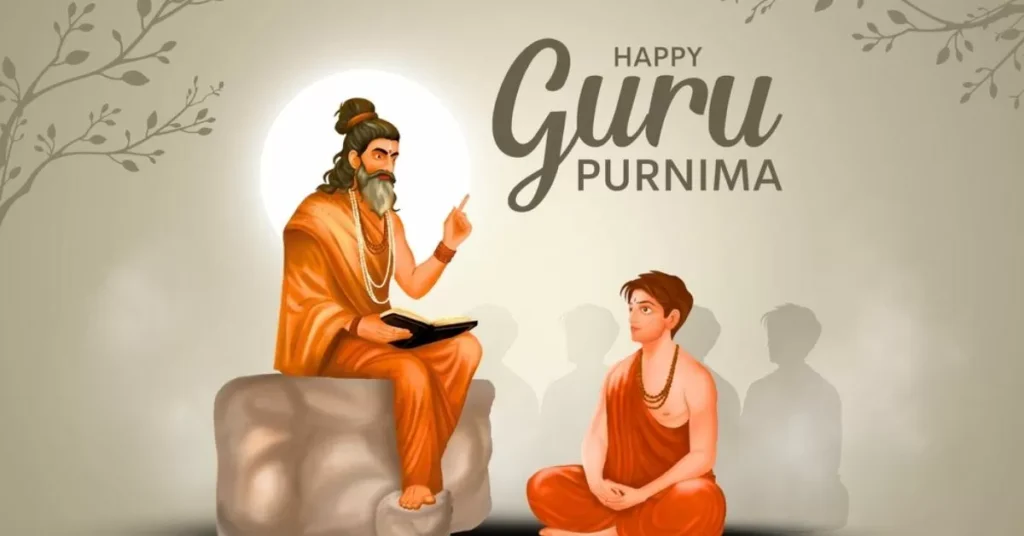Introduction:
In the tapestry of our lives, there are few threads as profound and transformative as the guidance of a Guru. As we approach Guru Purnima, a sacred day in the Hindu tradition dedicated to expressing gratitude to our teachers and spiritual guides, it’s an opportune moment to reflect on the significance of this timeless tradition.
Understanding Guru Purnima:
Guru Purnima falls on the full moon day (Purnima) in the Hindu month of Ashadha (June-July). It is a day when disciples express their reverence and gratitude to their Gurus, who illuminate their path with wisdom and spiritual knowledge. The word “Guru” itself holds deep meaning, derived from Sanskrit, where ‘Gu’ means darkness and ‘Ru’ means remover — a Guru is thus one who dispels the darkness of ignorance with the light of knowledge.

The Role of the Guru:
In various spiritual traditions around the world, the Guru holds a central place. They are not merely teachers but spiritual guides who impart wisdom, offer support, and lead disciples on the path of self-discovery and enlightenment. Whether in the realms of spirituality, academics, arts, or life itself, a Guru’s influence transcends boundaries, shaping character and inspiring growth.
Gratitude and Reverence:
Guru Purnima is a time for disciples to express their heartfelt gratitude to their Gurus. This is often done through rituals, prayers, and offering of gifts as symbols of respect and devotion. However, beyond these outward gestures, true homage lies in embodying the teachings imparted by the Guru — living with integrity, compassion, and wisdom.
Reflection and Renewal:
For disciples, Guru Purnima is also a day of introspection and renewal. It is an opportunity to reflect on one’s journey, assess personal growth, and recommit to the path of learning and spiritual evolution. Many use this day to resolve conflicts, seek forgiveness, and set new goals guided by the wisdom of their Guru.
Celebrations Around the World:
Guru Purnima is celebrated globally, beyond India, by communities that cherish the teachings of their spiritual guides. Temples, ashrams, and spiritual centers orchestrate elaborate ceremonies, discourses, and cultural events to mark this auspicious occasion. These gatherings are pivotal in reinforcing the universal values of gratitude, continuous learning, and spiritual camaraderie. In countries such as Nepal, Sri Lanka, and Bhutan, where Buddhism flourishes, Guru Purnima holds profound significance. Monasteries become focal points for chanting scriptures, meditation, and prayers, honoring Lord Buddha and his profound teachings. Meanwhile, in the Western world, yoga studios and meditation centers arrange workshops and retreats, underscoring the role of modern-day Gurus—yoga instructors and mindfulness coaches—as guiding lights. These events foster community and facilitate shared spiritual growth among participants seeking inner peace and enlightenment.
Moreover, Guru Purnima transcends religious and cultural boundaries, resonating with seekers of wisdom across diverse faiths and beliefs. In Islamic traditions, the concept of the spiritual guide, or ‘Murshid,’ mirrors that of the Guru in Hinduism, serving as mentor and spiritual counselor. Similarly, in Sufi circles, disciples honor the wisdom of revered saints and poets through music, dance, and recitation, highlighting humanity’s universal pursuit of divine knowledge and enlightenment.
The essence of Guru Purnima extends beyond rituals and geography, uniting people in their appreciation for the transformative power of guidance and wisdom. It serves as a poignant reminder that the quest for spiritual growth and understanding is a collective endeavor, uniting humanity in the pursuit of truth and enlightenment.
As we celebrate Guru Purnima, whether through traditional ceremonies or modern interpretations, let us embrace the opportunity to honor our mentors, reflect on their teachings, and renew our commitment to personal and collective enlightenment.
Guru Purnima is celebrated globally, beyond India, by communities that cherish the teachings of their spiritual guides. Temples, ashrams, and spiritual centers orchestrate elaborate ceremonies, discourses, and cultural events to mark this auspicious occasion. These gatherings are pivotal in reinforcing the universal values of gratitude, continuous learning, and spiritual camaraderie. In countries such as Nepal, Sri Lanka, and Bhutan, where Buddhism flourishes, Guru Purnima holds profound significance. Monasteries become focal points for chanting scriptures, meditation, and prayers, honoring Lord Buddha and his profound teachings. Meanwhile, in the Western world, yoga studios and meditation centers arrange workshops and retreats, underscoring the role of modern-day Gurus—yoga instructors and mindfulness coaches—as guiding lights. These events foster community and facilitate shared spiritual growth among participants seeking inner peace and enlightenment.
Moreover, Guru Purnima transcends religious and cultural boundaries, resonating with seekers of wisdom across diverse faiths and beliefs. In Islamic traditions, the concept of the spiritual guide, or ‘Murshid,’ mirrors that of the Guru in Hinduism, serving as mentor and spiritual counselor. Similarly, in Sufi circles, disciples honor the wisdom of revered saints and poets through music, dance, and recitation, highlighting humanity’s universal pursuit of divine knowledge and enlightenment.
The essence of Guru Purnima extends beyond rituals and geography, uniting people in their appreciation for the transformative power of guidance and wisdom. It serves as a poignant reminder that the quest for spiritual growth and understanding is a collective endeavor, uniting humanity in the pursuit of truth and enlightenment.
As we celebrate Guru Purnima, whether through traditional ceremonies or modern interpretations, let us embrace the opportunity to honor our mentors, reflect on their teachings, and renew our commitment to personal and collective enlightenment.
Conclusion:
As we observe Guru Purnima, let us acknowledge the profound impact of our Gurus on our lives. Whether they are spiritual leaders, mentors, or teachers, their guidance shapes our understanding and enriches our existence. May this day inspire us to cultivate reverence, embrace knowledge, and walk the path of enlightenment with gratitude in our hearts.
Let us cherish the light of wisdom that our Gurus impart, for it is through their teachings that we illuminate our own paths and contribute positively to the world around us.
Share your thoughts:
How do you celebrate Guru Purnima, and what significance does it hold for you personally?
